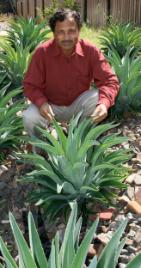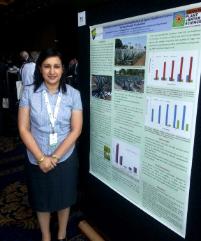A taste of success with Agave, source of tequila drink fuels interest
Published on 03 December, 2012
Agave tequilana, the plant which produces the tequila drink, is being investigated as a potential source for bioethanol fuel production in Queensland.
CQUniversity has been at the forefront of this research for several years and researchers have started to taste success.

Assoc Prof Nanjappa Ashwath with local Agave plants
Attending the recent Bioenergy Australia conference, research student Deepa Rijal has won best poster for describing her establishment of techniques for converting Agave plant biomass into ethanol, in collaboration with the NSW Department of Agriculture.
Deepa has also been testing the use of a Near Infra-red Spectroscopy device to detect the maturity of Agave for bioethanol production.
CQUniversity's Roshan Subedi also presented a poster on economic analysis of Agave tequilana production in Queensland. He is supervised by Dr Delwar Akbar, Professor John Rolfe and Associate Professor Nanjappa Ashwath.
Meantime, other CQUniversity researchers including Assoc Prof Ashwath, Phul Subedi and Grant Stanley have been collaborating with Agave grower Don Chambers of AUSAGAVE and bioethanol researcher Tony Vancov of NSW DPI.

Top conference poster presenter Deepa Rijal
Field trials have been established to demonstrate the plant's potential to serve as alternative raw materials for ethanol production units located around sugar mills.
Associate Professor Ashwath says preliminary results show significant variations between different cultivars and different species.
"This indicates that significant gains can be made by testing a larger number of cultivars and other species in Queensland," he said.
"We believe this is the first time the growth potential of various genotypes of Agave has been evaluated in Queensland. Also this seems to be the first attempt to determine ethanol production potential of the leaves of Agave tequilana in Australia."

